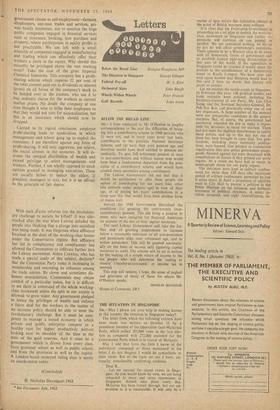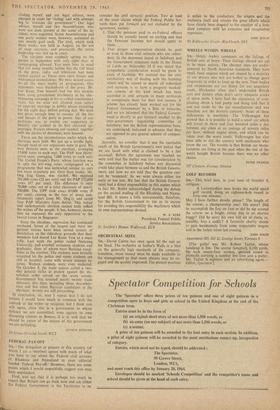THE SITUATION IN SINGAPORE
Sin,—May I please ask your help in making known in this country the situation in Singapore today?
The letter from which the following extracts have been made was written on October 11 by a prominent member of the Opposition (anti-Malaysia) Party, which polled 201,000 votes in the last elec- tion as compared with 272,000 recorded for the Government Party which is in favour of Malaysia.
May I add that from the little I know of the individuals concerned or those mentioned in the letter I do not imagine I would be sympathetic to their views. But of the facts set out I have, un- happily, considerable confirming evidence.
Dear R.
Let me recount the recent events in Singa- pore. As you would know by now, we are being subjected to more and more -repressions in Singapore. Arrests take place every day. Malaysia has been forced through, but our op- position to it is unalterable. It will only be a matter of time before this federation created at the point of British bayonets must collapse. 'It is clear that the Federation Government is proceeding on a set plan to destroy the working- class movement in Singapore and further re- pressions will continue on one pretext or another. We are convinced nothing we do or do not do will affect government's intentions. There appears to be a Western plan to do away with all democratic forms of government and to establish instead right-wing dictatorships in this part of the world. If the opposition in Singapore could be crushed it would mean the prelude to the establishment of a dictatorship based in Kuala Lumpur. We have over and over again warned that Malaysia would lead to this and I have no doubt that history will prove us correct.
Let me recount the recent events in Singapore. In February this year, 130 political leaders and trade unionists were arrested, including the Secretary-General of our Party, Mr. Lim Chin Siong, and the Assistant Secretary-General, Dr. Poh Soo Kai, t.nd practically every one of our key organisers. A large number of the arrested were our prospective candidates in the general elections. But, of course, the government had previously amended the law to make it impos- sible for detainees to stand for election. There had not been the slightest disturbances to justify these arrests, and up to this day not one of them has been brought to open trial. Ten pub- lications, including many university publica- tions, were banned. Our printers (a commercial organisation that also prints government propa- ganda directed against us) were threatened with cancellations of licence if they printed our party organs. As a result we have had to resort to mimeograph sheets for our party organs.
The detainees were kept in solitary confine- ment for more than 120 days (the maximum period of solitary confinement permitted by law is seven days). In April a procession of relatives went to City Hall to present a petition to the Prime Minister on the inhuman and barbaric treatment of political detainees. A minor in- cident occurred, and eight Assemblymen, in- ge, eluding myself and our legal adviser, were charged in court for 'rioting' and with attempt- ing to 'overawe the government'! Our legal adviser, myself and two Assemblymen, who were not even present at the scene of the in- cident, were acquitted. Seven Assemblymen and one party worker were, however, sentenced to one month gaol each. The trial, which took three weeks, was held in August, on the eve of snap elections, and practically the entire leadership was tied up in court. The elections were suddenly sprung on the people in September with only eight days of campaigning allowed. You must hear in mind that for many months before this the full blast of the press, radio and television had been turned agaihst us. There were open threats and widespread intimidations. We were denied access to, all the mass media of propaganda. Our statements were blacked-out of the press. Mr. Lee Kuan Yew himself had for live months been using government machinery in his elec- tioneering campaign in his so-called constituency visits. but we were not allowed even rallies or open-air meetings in public places excepting for the eight days before polling day. We were not given enough time to counter all the lies and threats of the party in power. One of our problems was to enable our supporters to identify our symbol in its first electoral ap- pearance. Posters showing our symbol, together with the photos of detainees, were banned.
These are the circumstances under which the elections were held. We put up a terrific fight, though most of our organisers were in gaol. We won thirteen seats at the elections, averaging 15.000 votes to each seat. The PAP won thirty- seven seats, averaging 7,000 votes to each seat. The United People's Party, whose function was to split the left-wing votes, campaigned on a programme that was somewhat similar to ours but more extremely put. Only their leader, Mr. Ong Eng Guan, was elected. We received 201,000 votes (35 per cent) and the PAP 272,000 votes (47 per cent). The difference is only 70,000 votes out of a total electorate of nearly 500,000. The UPP took away 49,000 votes (8 per cent), causing us the loss of seven con- stituencies (apart from Mr. Ong's), and saved four PAP Ministers from defeat. This unfair and undemocratic election cannot truly reflect the wishes of the people. It has, however, shown that we represent the only opposition to the fascist forces in Singapore.
Since the elections, repression has continued unabated. Seven of the largest and most im- portant unions have been served notices of dissolution on the ridiculous grounds that their members had booed Lee Kuan Yew at a mass rally. Last week the police raided Nanyang University ands arrested seventeen students and graduates, three of whom were Barisian candi- dates in the election. The students were brutally assaulted by the police and many students are still in hospital, some with severe internal in- juries. Women students were even molested. On October 8, the trade unions called a two- day general strike in protest against the dis- solution order served on the seven unions. Government has arrested nearly twenty trade unionists this time, including three Assembly- men and five other Barisian candidates in the elections. Arrests are still proceeding.
In conclusion, sir, may I repeat that I do not
believe I would have much in common with the outlook of the writer or recipient, but I think you will agree, since this is a government to whose defence we are committed, even against its own dissenting citizens in Borneo, it is as well that we should be aware of the nature of the government we are defending.
GEORGE EDINGER































































 Previous page
Previous page